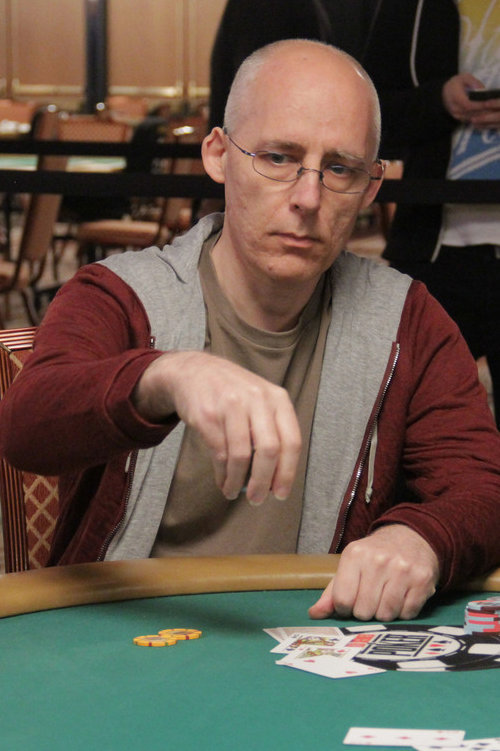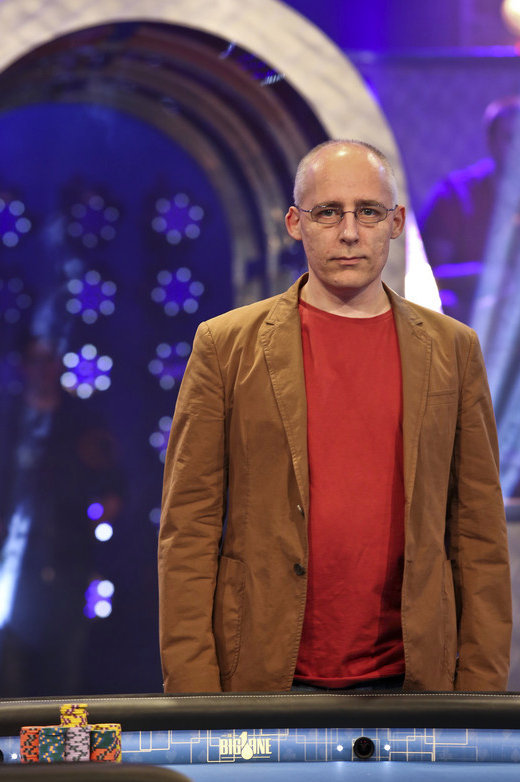






Talal Shakerchi: 'I Kept My Online Name Secret So Most Players Assumed I Was A Random Rec'by Erik Fast | Published: Mar 13, 2019 |
|
|

Talal Shakerchi is a highly successful investment manager from Great Britain. At first glance, the 54-year-old founder and CEO of Meditor Capital Management Limited might appear like just another businessman peppered among the young high-stakes tournament professionals that dominate the super high roller events.
But despite his busy workload, Shakerchi has managed to become a serious poker player with quite the impressive resume. He has accumulated more than $7.1 million in live tournament earnings, with millions more in online cashes. In fact, he took down one of the largest online tournaments ever, topping a field of 824 entries to win the 2016 Spring Championship of Online Poker (SCOOP) $10,000 main event for $1,468,001.
Shakerchi has strung together a number of big scores over the past two months, starting with a fourth-place showing in the 2018 $300,000 buy-in Super High Roller Bowl V for $1,188,000. He then managed to make two huge final tables at the 2019 PokerStars Caribbean Adventure, finishing eighth in the $25,000 buy-in PokerStars NL Hold’em Players Championship and fifth in the $100,000 super high roller. Those two scores earned him another $994,300.
Card Player spoke to Shakerchi shortly after he went on his final-table spree to learn more about how he got into poker, how he has managed to hold his own against the toughest players in the world, and much more.
Card Player: You have live tournament results dating back to 2007, and one of your first few live cashes was a third-place showing in a €10,000 buy-in main event in Paris. Usually, when one encounters someone who has such a big score so early in their live tournament career, it is because they had been crushing online poker for years. How was it that you came to participate in big live poker tournaments?
Talal Shakerchi: Poker wasn’t as tough back then. I played quite a bit online and quickly took to the game. I wanted to play in the toughest tournaments I could and believed at the time the best way to do that was to play big buy-in live events. So I soon started to play occasional events when I could make time.
CP: When did you first learn how to play poker, and how did it come to be such a big hobby of yours?

Talal Shakerchi in the WSOP $50,000 Poker Players Championship
It suited me as a hobby because poker theory was relatively limited (especially back then) so I had a chance to take on the best, which I found stimulating. That couldn’t have happened with games such as chess where exceptional talent and full-time dedication from an early age is required to compete at higher levels. Poker also seemed to chime well with my day job where many of the same attributes are necessary for success.
CP: By the time you recorded your first live tournament score, you had been the CEO of Meditor Capital Management Limited, which you founded, for nearly a decade. As a highly successful businessman, can you talk a little about your early experiences playing poker in big events? I’m particularly curious about anything you could share regarding what it is like being a businessman playing against top players.
TS: I enjoyed live poker because I liked the live aspects of the game and also met a wider range of people than I do in my work. The main thing I disliked was the slow pace. I continue to believe we need to find better solutions to the time issue.
For the first few years I didn’t play many events and I kept my online name secret so most players assumed I was a random rec, particularly as I am older than the typical online player. People picked up that I was a hedge fund manager and assumed I didn’t play much poker. That was a good spot for me game-wise. On the other hand, I was handicapped relative to other players because I had a lot going on outside poker so at live events I would often be dealing with calls or emails during breaks and after play ended for the day. Also, I couldn’t spare much time to travel so if the event was overseas I often arrived on the day and jumped into the tournament without a rest.
Later on, people connected me with my online persona. Many people expressed disbelief when they first heard I was the ‘raidalot’ that played and posted online. The cat leaving the bag changed the way people played against me which made it tougher.
CP: Did you seek out tough competition for the challenge? Or did you just end up playing such tough competition because you enjoyed playing for high stakes?

Shakerchi at the 2012 Big One For One Drop
CP: What inspires you to continue playing and working on improving your poker game? Is holding your own against the best players a motivating factor?
TS: When I do something seriously I want to be among the best in the world. I enjoy learning and improving. I enjoy strong competition and it motivates me to improve. Today I am enjoying developing my mixed-game skills because the learning curve is steeper for me.
CP: You made some big scores early in your career, but in recent years your deep runs have became more and more frequent. To what would you attribute your improved results? Have you been actively studying the game the way a full-time professional might?
TS: The recent run of results is just variance. I don’t think I am much better now than recent years. I’ve always studied the game. I’ve read about 80 poker books, watched hundreds of training videos, and spent endless hours analyzing hands and situations, and reviewing toy games. I can’t dedicate the time that a pro can but it is a pretty intensive effort over more than a decade.
CP: In May of 2016 you won the SCOOP main event, one of the largest and most prestigious online tournaments in existence. Can you talk a bit about that incredible win and what it means to you? Also, how much online poker do you play, and do you enjoy it as much as live poker?

Shakerchi in the 2018 WSOP $100,000 buy-in event
I used to play a ton online, mostly to help improve, but now I play less and generally focus on bigger events and Sundays.
CP: Three of your five biggest live cashes have come in the last few months alone, with a fourth-place finish in the Super High Roller Bowl in December and two big scores in massive events at the PokerStars Caribbean Adventure. Of the three final tables you made, which would you have most liked to come away with?
TS: Of those events I would most liked to have taken down the SHRB because that was the toughest or the PSPC because it was a five-day event and had a special air about it. Both also had big money up top.
CP: The PSPC was a very unique event. Can you share your thoughts on the Platinum Pass approach and the tournament in general?
TS: I thought the idea of the event, and the execution, were excellent. The Platinum Passes gave a large number of players a real shot at a dream, and you could sense that in the air. There was almost a mini-Moneymaker effect and it was interesting that the final table was not packed with pros as many expected. I’ve given Stars a pretty hard time in recent years for abusing their dominant position but on this one I have to applaud them for putting something back into the game in a positive spirit. I hope they do something similar next year.
CP: You were eliminated from the $25,000 buy-in PokerStars NL Hold’em Players Championship in brutal fashion, picking up pocket aces in a great spot and getting all-in against eventual-winner Julien Martini’s A Q
Q . Do you think he made a mistake by calling your shove, seeing as you cold four-bet all-in? Or, due to the stack size, was it just a situation where he had to call in your eyes, and it just was unlucky for you that he managed to make a flush? (You can watch the full hand in the video below.)
. Do you think he made a mistake by calling your shove, seeing as you cold four-bet all-in? Or, due to the stack size, was it just a situation where he had to call in your eyes, and it just was unlucky for you that he managed to make a flush? (You can watch the full hand in the video below.)
TS: It’s a tough spot for him because of the sizing. He probably knows that I almost never have worse than his hand in that situation (except against players I have history with) but he is getting close to 2:1 on the call which prices him in unless he thinks I have a particularly tight range. I suspect he would have mucked if he wasn’t suited. The fact that the under-the-gun opener, Marc Rivera, was playing fairly tight in that event strengthened my range so perhaps he should have found a fold.
CP: Your strong start to the year has you within striking distance of the top 20 of our Player of the Year race standings. If you found yourself as a top contender later in the year, would an award like that (that attempts to quantify the best performance over a whole year) be something that you might chase?
TS: Unfortunately, I cannot play many live events each year. I play 10-15 tournaments over three or fofur trips and often the trips are focused on a single event like SHRB. So it is extremely unlikely that I would be anywhere near the top of the Player of the Year race standings. I guess if, by some bizarre twist of fate, I was close to the top near year-end then it might be a factor in choosing whether to play an event. That would be a pretty cool title to win. 
Features
The Inside Straight
Strategies & Analysis